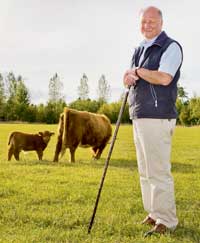Cut budgets by putting regulation in farmers’ hands, says Paice

Tackling red tape is central to meeting the 29% budget cut set out in the spending review on 20 October, according to farm minister Jim Paice.
“This is a massive reduction. We can only accomplish it if we change how we regulate the industry,” he said.
Mr Paice criticised previous ministers for promising a “bonfire of regulation that never happens”, and said he would be looking for a culture change among farming and its administrative bodies.
“Most regulations have at their heart a sensible objective. But this country has been obsessed with process. We should be able to trust farmers to do the right thing. We should be trusting farmers much more in how you deliver regulation.”
Targets have yet to be set for the savings expected to come as a result of actions taken by the taskforce on farming regulation, headed by former NFU director general Richard Macdonald. So far, only a date in early 2011 has been agreed for the red tape report.
The MP for south-east Cambridgeshire was clearer on one area where administrative overspend could be curbed. And he was in no doubt as to which agency would see the sharpest axe.
“The Rural Payments Agency is having to make significant savings, which shouldn’t be too difficult. It’s had a bad IT system that it has mismanaged and has been dealing with inefficiencies in itself and its workforce.
“These are failings of management and I’m determined they will be resolved,” said Mr Paice, who has joined the RPA board to make sure any changes are seen through.
More farmers switching from paper to online applications would be the key to making savings, added Mr Paice – the cost per claim processed was currently £1043 and the RPA has a new target of £870.
This year was the first in which all farmers could make applications using SPS online. An uptake of 16,224, out of a total 107,155 SP applications, exceeded the target of 10,000 which Mr Paice welcomed.
But the minister was less able to provide detail on how DEFRA was going to cut costs in other areas.
On flood defences he told Farmers Weekly that the potential impact on farmland of a proposed 15% budget cut for flood protection had not been worked out. He could only express his sympathy with farmers and landowners battling against flooding.
“I do think it’s absurd that a plan by an individual landowner to improve flood defences should be blocked by the Environment Agency.
“We’re looking to encourage a wider range of options, including those from the private sector,” he said.
And on green schemes, Mr Paice said a four-year plan would not begin until next April. The government had already banked £66m savings on the Rural Development Programme for England as a result of sterling’s exchange rate with the euro.
Other match-funding and accountancy variations realised since the RDPE was agreed would mean that the total spend would be lower than anticipated. But he insisted that overall payments to farmers from schemes such as Entry-Level and Higher-Level Stewardship would not be curtailed.
“The 80% increase unveiled last week was within the original targets set by the previous government for HLS, Mr Paice said.
“We’ve provided funds over the next four years to achieve a 70% coverage by ELS and HLS. Within that we will be honouring previous agreements and encouraging more to join, aiming for an 83% rise in the scheme.”
Farmer returns would not be affected, Mr Paice added. And he denied that there would be a trend towards funding for higher-standard schemes, restricting most farmers from accessing funds.
“They won’t be unattainable, although Natural England will be concentrating on protecting areas of most environmental sensitivity.”
